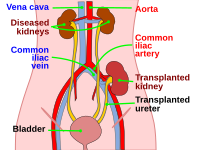
Photo from wikipedia
Introduction Infectious complications are a common cause of morbidity and mortality in kidney transplant recipient. The aim of this study is to evaluate the occurrence of bacterial, viral and parasitic… Click to show full abstract
Introduction Infectious complications are a common cause of morbidity and mortality in kidney transplant recipient. The aim of this study is to evaluate the occurrence of bacterial, viral and parasitic infections in kidney transplant recipients. Material and Methods This is a retrospective and descriptive study; we evaluated the risk factors and outcomes of infectious complications in the first year after transplantation. Results About 66 patients were evaluated. The recipients included 46 males and 21 females of overall mean age of 37.2 +- 9.6 years (range, 20 - 57 years). For the 66 patients, 68 infectious episodes occurred. The most frequent infections were urinary tract infection (51.47%), respiratory tract infections (17.64%) and cutaneous infections (14.7%). Gram negative rods were found to be major pathogen in urinary tract infections cases. Viral infections after transplantation were CMV infection (5.8 %) and zona zoster (2.9 %). During the first 3 months 22 infectious episodes (32.35%) were observed; 11 infectious episodes (16.17%) between 3 and 6 months and 14 infectious episodes (20.58%) between 6 and 12 months post renal transplantation. Discussion Our study showed similar results concerning urinary and CMV infections. Because of immunosuppression, kidney transplant recipients are vulnerable to a wider variety of common and opportunistic infections and may not demonstrate classic signs and symptoms of infections, so a heightened knowledge and awareness of these risks are required for accurate diagnosis and proper care. The first month after transplant is characterized by hospital-acquired and post surgical infections as well as donor-derived infections. From 1 to 6 months, kidney transplant recipients are susceptible to a variety of opportunistic infections, including CMV, herpes simplex, varicella zoster virus like in our study. In our patients, no cases of aspergillus or tuberculosis were noted. After 6 months, transplant recipients are usually infected with more common infections, such as Pneumococcus, Legionella, and respiratory viruses, although the risk of opportunistic infections is never eliminated. Conclusion Infectious complications in kidney recipient cause morbidities and mortality. Early diagnosis and successful treatment of these complications are paramount to prevent graft failure and other significant morbidities to the patients.
Journal Title: Transplantation
Year Published: 2018
Link to full text (if available)
Share on Social Media: Sign Up to like & get
recommendations!